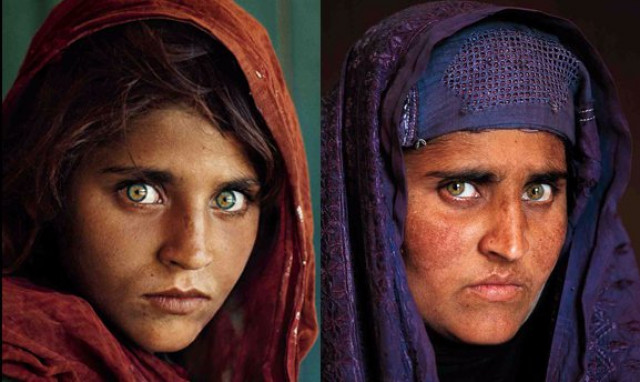Sharbat Gula – The face of Afghan plight
Islamabad must consider giving foreigners another chance to voluntarily submit illegally-obtained ID cards

A then and now image of Sharbat Gulu published in National Geographic in 2002
Gula again made headlines in 2002 when McCurry rediscovered her and put her back on the cover of National Geographic. If it was not for her eyes, Gula was far from recognizable. Her face yet again brought the forgotten Afghan migration and the odds they withstand in Pakistan - their ‘prolonged temporary’ home – into the limelight. She personified the impact of cold-blooded geo-politics.
FIA arrests NatGeo’s Afghan girl in Peshawar
Last week, the same Gula was in news again. The Federal Investigation Agency in Pakistan arrested her for possessing fraudulent identity cards. She had been living with her spouse Rehmat Gul, who remains at large, in a shantytown near Peshawar and three of her daughters - Robina, Zahida and Alia - are now married.
Gula pleads innocence while media personnel, particularly McCurry, defend her as an icon of hardship that must be forgiven. The asthmatic Pashtun woman is again lending her face to the cause of Afghan refugees and Afghanistan with added bitterness.
Any Afghan possessing illegal Pakistani identity papers faces up to 14 years in prison and a fine of $3,000 to $5,000 if convicted. Gula is found possessing a Pakistani computerized identity card issued in 2014, while retaining her Afghan passport, which she used that year to perform Hajj. The legal case against her is strong. The evidence is irrefutable.
Govt won’t oppose Sharbat Gula’s bail on humanitarian grounds
Had elusive Taliban warlord Mullah Mansour not found possessing Pakistani identity card and passport, Gula might not have been in jail today. The probe launched since his assassination on May 22 near Iran-Pakistan border has led to cancellation of over 3,000 illegal CNICs belonging to foreign nationals, particularly Afghans. It’s for the first time since the Soviet invasion of Afghanistan that sentiments against Afghan refugees are high.
Islamabad is taking a lenient view and suspending repatriation process for three months or more, owing to severe cold in Afghanistan where its returning citizen won’t have shelters and amenities ready and waiting. Because of an exodus in Syria due to the ongoing civil war, UN agencies are also confronting severe donor fatigue. Gula’s case may bring some attention to the abandoned Afghan refugees who are returning to empty villages and ghost towns despite the incompetence and apathy of the Ghani-Abdullah government. The process of repatriation cannot be paced up for obvious logistical and financial constraint. The remaining two million refugees will stay in Pakistan for another year or more.
The case of Gula is not unique. The law may require her to be jailed and fined but Pakistan can use the issue for raising awareness about the refugee crisis in this part of the world while generating goodwill instead of adverse media coverage in the international community. Releasing her on health grounds and repatriating her back to Afghanistan at a suitable time serves both sides.
Afghan ‘cover-girl’ rebuts charges, sent to jail
Rehmat Gul, however, deserves to face the consequences of his action. Gula likely had his help in cleverly dodging the system. Since the family possessed valid identity cards for both Pakistan and Afghanistan, the question of registration with the government and UNHCR never arose. Consequently, the family never declared the illegal documents to avail amnesty offered after the verification process of identity documents was initiated.
Pragmatically speaking, Islamabad must consider giving foreigners including Afghans another chance to voluntarily submit the illegally-obtained identity and travel documents. This incredible saga of generosity must not end on a harsh note. The goodwill gesture will also help improve Pakistan’s image among the Afghans as well the rest of the world in the face of barrage of ill-intentioned propaganda.
Naveed Ahmad is a Pakistani investigative journalist and academic with extensive reporting experience in the Middle East and North Africa. He is based in Doha and Istanbul. He tweets @naveed360



















COMMENTS
Comments are moderated and generally will be posted if they are on-topic and not abusive.
For more information, please see our Comments FAQ